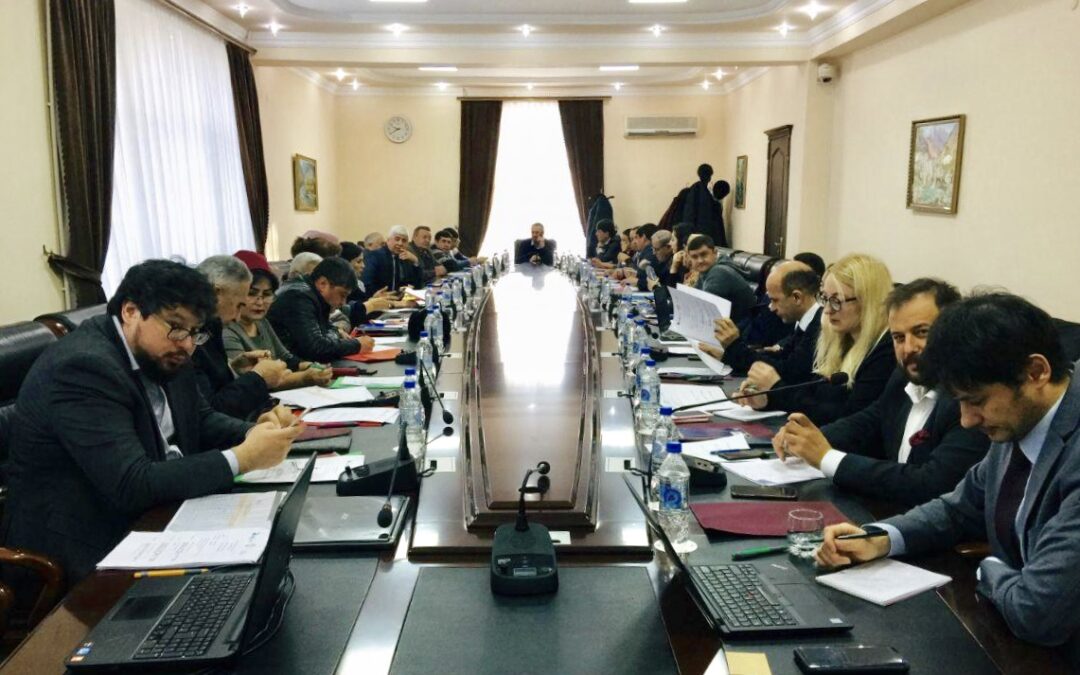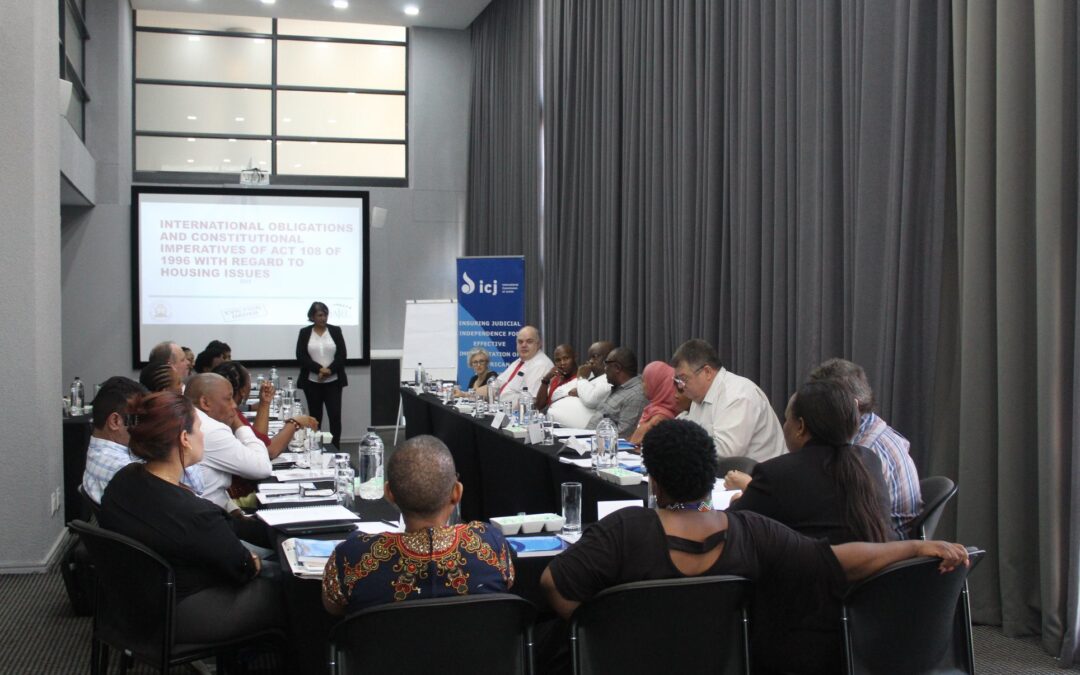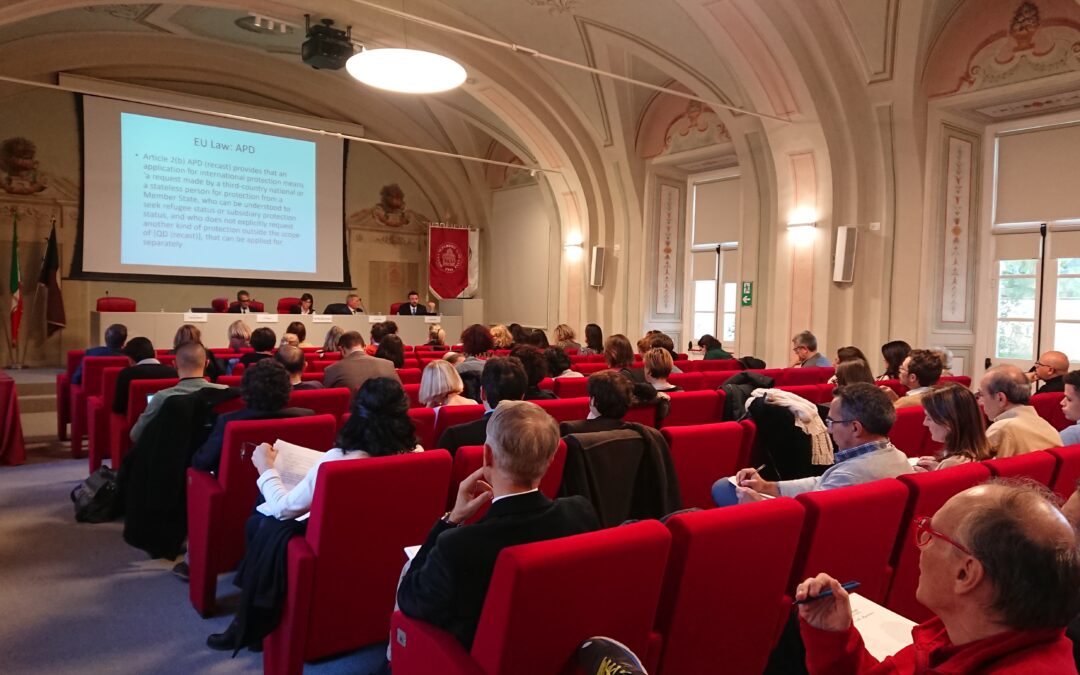
Dec 16, 2019 | Events, News
On 16 and 17 December, the International Commission of Jurists (ICJ) in cooperation with the Tajikistan Bar Association (Tajikistan Union of Lawyers) and the Legal Policy Research Centre (LPRC) is organising a seminar “The Role of the Bar Association in ensuring security of lawyers”.
During the two-day event, lawyers from across Tajikistan as well as members of the specialised bodies on the rights of lawyers of bar associations Kazakhstan and Ukraine will discuss key main challenges lawyers face in their countries when defending their clients.
Regular attacks on independent lawyers as well as effective ways of addressing cases of harassment, intimidation and other interference by the Bar Association and its specialised bodies will be discussed during the first day of the event. During the second day, the participants will elaborate a strategy of development for protection of lawyers in Tajikistan.
The president of the Bar Association of Tajikistan as well as all members of the Commission on the Professional Rights of Lawyers of the Bar Association of Tajikistan will take part in the event.
The ICJ expresses appreciation to the Ukrainian National Bar Association for the participation in the event.
The agenda of the event here.

Dec 16, 2019 | Agendas, Events, News
Today begins in Ankara (Turkey) a one-day workshop for lawyers and CSO practitioners to discuss and brainstorm on an alternative Justice Reform Strategy.
This event is organized by ICJ, in cooperation with its partners Kapasite Geliştirme Derneği and Human Rights Joint Platform, as part of a EU co-financed project Rebuilding and Ensuring Access to justice with civil society in Turkey.
The workshop aims at discussing the key reforms proposed by the Government of Turkey in its Judicial Reform Strategy and provide with an assessment and an alternative plan for reform based on international standards and jurisprudence on access to justice and the independence of the judiciary.
The workshop will provide presentations on international standards on the judiciary as well as on access to justice for human rights violations. It will produce a ten point strategy document to propose reforms that will uphold the independence of the judiciary and access to justice in Turkey.
The project is funded by the European Instrument for Democracy and Human Rights (EIDHR) of the European Union.
Turkey-Workshop-Agenda-AltJRS-Ankara-2019-eng (download the agenda)

Dec 10, 2019 | News
Today’s decision from the European Court of Human Rights in the case of Turkish human rights defender Osman Kavala must be immediately complied with by releasing him from detention, the International Bar Association Human Rights Institute (IBAHRI) and the ICJ said today.
In the case of Kavala v Turkey, the European Court of Human Rights held that the detention of Mr Kavala, in connection with his role in the Gezi Park protests of 2013, violated the right to liberty (Article 5.1) and the right to a speedy judicial review of detention (Article 5.4) under the European Convention on Human Rights (ECHR). The Court also found that his detention involves a restriction on rights for an improper purpose (Article 18). As a consequence of these findings, the Court specifically held that ‘the government must take every measure to put an end to the applicant’s detention and to secure his immediate release’.
The Turkish government has a legal obligation to comply with the judgment of the European Court of Human Rights. The IBAHRI and ICJ urge the authorities to abide by their obligations under the ECHR by immediately releasing Mr Kavala.
Mr Kavala has been in detention since 18 October 2017 pending trial on charges connected to the Gezi Park protests. The Gezi Park protests began in May 2013 as an effort by a group of environmentalists to save a park in central Istanbul from being rezoned, but soon grew into nationwide demonstrations. Police quelled the protest in Taksim Square with the use of tear gas and water cannons.
Mr Kavala’s trial, along with 15 other defendants, is ongoing before Istanbul 30th Assize Court. The defendants are charged under Article 312 of the Turkish Criminal Code (an attempt to overthrow the Turkish government or an attempt to prevent it from fulfilling its duties), Article 151 (damage to property), Article 152 (qualified damage to property), Article 174 (possession or exchange of hazardous substances without permission), Article 153 (damaging places of worship and cemeteries), Article 149 (qualified robbery), Article 86 (intentional injury), crimes under the Law on Firearms, Knives and Other Tools no. 6136, and crimes under the Law on Protection of Cultural and Natural Assets no. 2863.
The IBAHRI and the ICJ have jointly sent international observers to attend all hearings of the trial. The organisations will jointly release a trial observation report upon conclusion of the trial.
Contact:
Róisín Pillay, Director, Europe and Central Asia Programme, t: +32 2 734 84 46 ; e: roisin.pillay(a)icj.org

Dec 6, 2019 | Events, News
This year, the ICJ collaborated with the South African Judicial Education Institute (SAJEI) to conduct workshops aimed at strengthening the ability of judicial officers, including Magistrates, to deliver judgments in line with the Constitution and international law. The workshops focused on housing rights and informal traders’ rights.
Topics covered included the social and economic context of South Africa, the role of judicial officers in ensuring the protection of economic, social and cultural rights (ESCR) and the obligation to consider international law standards.
The workshops were conducted using the ICJ Practitioners’ Guide on ESCR and tailor-made training resources that the ICJ designed and produced with SAJEI, while the European Union and the German Institut für Auslandsbeziehungen’s Zivik programme supported the training financially.
Senior magistrate and judicial educator at SAJEI Jinx Bhoola and ICJ Legal Advisor Tim Fish Hodgson facilitated the workshops with the support of ICJ Associate Legal Advisor Khanyo Farisè.
Most of the judicial officers who participated were Magistrates.
“Ensuring effective access at a magistrates’ court level is crucial as Magistrates are the judicial officers concerned with delivering justice in the majority of cases at first instance level. Besides, the majority of people living in South Africa will rarely have the means or assistance to access justice in High Courts,” Hodgson said.
The workshops aimed to introduce the international human rights law and standards framework on social and economic rights to Magistrates.
“The hope is that Magistrates will be able to more effectively perform their functions, while drawing on international law, in cases relating to housing rights and the rights of informal traders if equipped with easily accessible resources to do so,” Hodgson added.
Adding to this, Farisè said: “There is sometimes an assumption that certain groups of individuals are excluded from the rights provided for in the Bill of Rights. It must be emphasized that international human rights law and the right to dignity in the South African Constitution apply to all”.
“When considering these cases, it’s important that judicial officers including Magistrates, have a human rights approach,” Farisè added.
The workshops were well-received. “The Magistrates engaged with energy and enthusiasm with the workshop material, confident that they will be able to ensure the enforcement of socio-economic rights and the securing of access to justice for all in South Africa,” Hodgson said.
Contact:
Khanyo Farisè, Legal Adviser, e: Nokukhanya.Farise(a)icj.org
Tim Fish Hodgson (Legal Adviser), e: Timothy.Hodgson(a)icj.org

Dec 3, 2019 | Agendas, Events, News
Today, the ICJ together with Scuola Universitaria Sant’Anna and Scuola Superiore de la Magistratura hold a training seminar on access to the asylum procedure and the right to an effective remedy in Pisa, Italy.
The training seminar brings together 65 Italian judges and lawyers specialized in access to international protection. During the two days of training, experts from the CJEU, Italian judiciary and academics, UNHCR and ICJ will deliver the training, bringing international human rights and EU law perspectives to the discussion on Italian law and practice.
Among the issues discussed during the training seminar will be access to the asylum procedure in international and EU law, access to the asylum procedure and accelerated procedures in light of the right to an effective remedy, appeal, legal assistance and legal aid, and interpretation. Further issues including the burden of proof in international protection cases and duties of cooperation with the asylum authority will be examined from the perspectives of judges, of territorial Commissions and lawyers as well as from the international and EU law perspective. Finally, working groups on burden of proof, credibility assessment of asylum seekers and countries of origin of asylum seekers will take place.
See the full agenda here.
This training is a part of FAIR PLUS project. It was carried out with the financial support of the European Union. Its contents are the sole responsibility of ICJ and do not necessarily reflect the views of the European Union.









